- Home
- Thomas Harris
Cari Mora Page 15
Cari Mora Read online
Page 15
Marco took a magnet from his pocket. It stuck to the cube.
“Stainless like the other side,” he said. “No soft spots here.”
“See any seams?” Favorito said, studying the video image on his laptop.
“Neat bead welds. Flawless, just about. TIG welds, same as the front. They did not make this fucking thing down here.”
“Tap it,” Favorito said.
A sucking sound from the passage under the seawall. A few bubbles came up.
Captain Marco took a small hammer from his belt and tapped the cube. The sound changed a little as he tapped from the center to a corner.
“Same as the front. Maybe five inches thick. I’m going to look around the edge of the collar. You getting a good image?”
“Wipe your lens, please, Marco.”
Marco had a cloth in a plastic bag and he wiped the camera first and then his mask. “Hel-lo. There’s a spot here, see it?” He put his finger on the cube. “Size of a pencil. That ain’t good. Coming out.”
Sucking sounds from the underwater hole into the bay.
Marco waded toward the pillar of light coming through the hole above him. He stumbled over something and the top half of Felix bobbed up, all swollen and gnawed, Felix’s organs hanging out where he was torn in half.
Marco, in a frenzy to get away, stepped on Felix. Felix’s eye popped and the gas gagged Marco even in his mask. The half corpse began to move, was ripped away as Marco raised his bang stick.
A sucking sound from beneath the seawall. Marco moved as fast as he could through the water, line disappearing fast up through the garden hole.
“Pull it! Pull it!” Marco yelled, his voice muffled in the mask.
He was swinging, his feet drawn up, going up toward the light, and beneath him the bubbles came up in the water in a coffin shape. Esteban and Ignacio were straining at the winch, he heard jaws snap below his feet and then he was up in the light.
Captain Marco sat on the ground wheezing and heaving, his wet suit peeled down to his waist. Offered water, he chugged a couple of swallows and heaved it up into the flower bed. Cari brought him cold water to rinse his mouth and a shot of rum.
Don Ernesto touched Marco’s head like a bishop bestowing a blessing.
They looked on the laptop at the images from Marco’s camera.
“Probably the iron gravel barge sunk in the landfill is what occupied the FBI’s metal detectors,” Don Ernesto said.
“They probably drilled and hit it a few times,” Favorito said.
Don Ernesto pointed to the spaced punctures in Felix’s body. “It’s a saltwater crocodile. Gomez—do you recall?—didn’t Cesár succumb to a saltwater crocodile after he and his partner defaulted on the loan?”
“Yes, he succumbed in Lago Enriquillo under the bridge near his office,” Gomez said. Gomez was practicing judicious speech, like that of the Don. “The crocodile carried him away and it seems very likely that it ate him.”
“They can’t chew,” Don Ernesto said. “They maintain a larder under the water so their meals can rot and get soft and palatable. The crocodile took this man away and then it brought him back to ripen.”
Favorito pointed to his screen. “It’s a good thing we looked at the cube. See this spot Marco found?”
“It’s got a mercury switch, you can’t move it,” Cari said.
“This was a hole, sealed with solder and polished over,” Favorito said. “After you seal something up with a charge in it, you can stick a wire into a hole through the side of the box like that to arm a mercury switch. When somebody tries to move the box—boom. It’s old-school IRA.”
Cari nodded. “An Irishman was teaching us how to make mortars out of Kosan Gas cylinders and he showed us that too. He signed his name to each one of the mortars. It was ‘Hugh G. Rection.’”
“Probably an alias,” Gomez said, speaking judiciously.
“Could we cut it from the back with a plasma torch?” Don Ernesto said.
Favorito shook his head. “It was me setting it up? I’d have infrared sensors inside just to catch you doing that.”
He took a long breath. “We need the person who set this up. To move it we might freeze a mercury switch with liquid nitrogen. But you’ve got to keep it cold—minus thirty-seven—or POOF. The optical stuff I don’t know.”
“Pablo wasn’t sealing up his money forever. He meant to get to it. So there’s a way in. Will you try it?” Don Ernesto said.
“Let me think about it,” Favorito said. He looked down at his numb legs. “Sometimes I don’t think enough.”
“Think for half an hour,” Don Ernesto said.
They studied the images on the laptop. Favorito ran his finger along a weld. “Not everybody can weld this stuff. See, it’s TIG. Look what he was doing here, look at him here, just walking the cup along the seam. Really nice work. It’s a small club, guys can do that. Let’s see the building permit for the patio work, that’s when they put this thing in.”
Favorito put Marco’s photos of the cube into a picture-editing app, Photo Plus, and hit the enhance button.
“Oh, yeah, thank you Marco!” Low on the side of the cube in the shadow of the flash were three letters written in grease marker. “T-A-B—Thunder Alley Boats. Don Ernesto, I know where to ask, but I will need some dulces.”
“Money or llello?” Don Ernesto said.
“Both is better.”
Chapter Thirty-Five
The crocodile, pleasantly full, swam south, submerging whenever a boat came by. She was a fourteen-foot saltwater crocodile and she spent part of her time in the Everglades eating juvenile Burmese pythons and the odd muskrat and nutria, but she preferred the salt bay of the South Bay Country Club, where she basked on land near the golf course fairway.
There were other crocodiles in the bay near the golf course, a Nile crocodile or two and some alligators near the freshwater springs, all enjoying the warm sun on the plates of their armor.
Best of all, pest control at the golf course got rid of the moths and butterflies that tickle a crocodile’s tear ducts with their prickly feet in order to drink the tears.
The crocodile dozed and watched the golfers in their Bermuda shorts.
Unfortunately, dogs were not allowed on the golf course. Sometimes neighbors—often nonmembers—sneaked onto the course in the evenings with their pooper-scoopers and plastic bags, letting their little dogs romp along the water’s edge.
Crocodiles, unable to chew, must eat large creatures in chunks after they have decomposed and softened. But Chihuahuas can be swallowed whole, as can corgis, Lhasa apsos and shih tzus. They can be eaten fresh without having to soften in a larder, such as the one the crocodile maintained beneath the Escobar house.
Other than Felix, the crocodile had eaten only one human, a drunk who fell off a boat full of drunks and was not missed at the time or ever accounted for or mourned. She had a buzz for perhaps an hour after eating him.
The crocodile did not dwell on eating humans, but with her prodigious memory for food and the locations of food, she did recall how refreshingly free humans were of hair and feathers and tough hide and horns and beaks and hooves. Unlike a pelican, which is more trouble than it is worth.
Dog owners with their shorts and their plump white legs, sneaking along briskly in the gloaming following their pets, were attractive to her and they could not see very well as the light failed. It only called for patience.
The crocodile suffered some small discomfort in the night passing Felix’s headlamp, and left it beside the fairway, to the puzzlement of the groundskeepers.
Chapter Thirty-Six
Diego Riva was a handsome man who claimed, falsely, to be the grandson of Cesar Romero. He wore the resentful expression of a man whose substance is less than his looks.
He found sharing nearly impossible and it pained him to see others enjoying nice things.
He was particularly resentful of the comfortable house Don Ernesto had provided for the widow of Jes�
�s Villarreal. The house and the funds provided for Señora Villarreal had not passed through the agency of Diego Riva and he had no chance to wet his beak.
A visit to Señora Villarreal after Jesús’s death was unprofitable. He pointed out the justice of his receiving a fee and she was unmoved, sitting in her nice surroundings and cosseted by domestic help, while her fierce sister supported her with acid commentary from a seat in the corner.
Back in his office after the visit, Diego Riva sat stewing through most of the afternoon, his neck pulled down into his collar and his eyes going from corner to corner of the room.
He had altered the diagrams and instructions Jesús provided on how to open the vault in Miami, but he was not sure Don Ernesto would pay him to correct them. And if Don Ernesto did not pay and obtain the corrections, there would be a very loud noise in Miami Beach and no one left to pay him anything.
A little research revealed that the biggest whistleblower reward payout by the U.S. government last year was $104 million. Rewards on recovered valuables ran between ten and thirty percent. Making his calculation with a short golf pencil, he found that on $25 million in gold his reward would be, at a minimum, $2.5 million directly into his pocket.
He decided to rat Don Ernesto out.
His call to the Office of the Whistleblower, Securities and Exchange Commission, Washington, D.C., bounced through a few switchboards before it reached the very friendly voice of a woman at the Department of Homeland Security.
She felt around for his resentments, being accustomed to dealing with disgruntled bank employees and sour corporate underlings. She assured Diego Riva that he was doing the right and righteous thing. The terms she used were “correcting a bad situation” and “seeing that justice is served.” She referred to informants as “relators.”
She was recording her talk with Diego Riva without the statutory warning beeps. The recorder stood beside a small sign on her desk that read WHAM, BAM, QUI TAM!
There is a certain amount of cooperation among the sundry whistleblower programs operated by the IRS, the SEC, the Department of Justice and the Department of Homeland Security. The custom is, whoever answers the cold call from a whistleblower encourages and pumps the caller and the matter is referred to the proper authority later.
The agent assured Diego Riva that, even if he had given information to another agency already, the SEC would pay off for 120 days after the earlier disclosure.
Diego Riva said he would require written confirmation of a reward and that his information would result in the recovery of a lot of explosives as well as gold in the continental United States.
The DHS agent told him that might require a few hours. Diego Riva said he could provide no more information until the paper was in his hand. He sat by his telephone and his fax machine.
An agent reassigned on short notice from Homeland Security’s Container Security Initiative in Cartagena watched Riva’s house until relieved in the evening by an ICE agent from Bogotá.
Chapter Thirty-Seven
Favorito looked at Nuestra Señora de Caridad del Cobre painted on the vault door, and the image looked back at Favorito in his wheelchair. The boatmen she protected struggled on the painted waves.
Favorito was seated at his card table. On the table were a gauss meter, a volt meter, a half dozen powerful magnets and a stethoscope.
Don Ernesto, Gomez, Marco, Esteban and Cari were watching, Cari and Esteban on the stairs to clear floor space in the small basement room. Don Ernesto had Gomez beside him; Gomez could pick up Favorito, wheelchair and all, and carry him up the stairs in a hurry.
The image of the saint was floodlit, brilliant in the dim basement.
“We know now they did the metalwork at Thunder Alley Boatyard,” Favorito said. “The people I talked to said Pablo himself came to see it. They trucked the cube to the construction site here and lowered it with a crane into the ground. It was all solid ground then. Nobody from Thunder Alley saw it wired. Pablo must have brought somebody up from Cali to do it. The city gas is cut off at the street, right?”
“Yes,” Cari said. “I shut it off.”
Benito called from Miami International Airport where Don Ernesto had sent him to meet the incoming DC-6A and check out the loading equipment on the old airplane; Benito had loaded a lot of DC-6s in his time. The airplane was refueled and ready and the lift was good, he reported.
There was nothing to wait for. Do it or don’t.
Favorito tested his magnets. Spread in front of him were the papers and drawing from Jesús Villarreal. Favorito lit a cigarette.
“Do you think you ought to smoke in here?” Gomez said.
“I sure do,” Favorito said. “Okay. According to this diagram, the magnets go on the rondels beside the boatmen, there and there. With the third magnet you go to the legend across the bottom of the painting, YO SOY LA VIRGEN DE CARIDAD DEL COBRE, see ‘virgin’ is spelled with an ‘E.’ You tap on the letters with the magnet and spell out ‘A-V-E.’”
Favorito dried his hands on a paper towel. “Don Ernesto, if anyone or everyone wants to leave, now is the time to do it. I will ask you one thing. From now until we are finished in this room, everyone needs to do what I say. I will respectfully ask that this includes you, Don Ernesto.”
“A sus ordenes,” Don Ernesto said.
Favorito took a deep drag on his cigarette, dropped it to the floor and rocked his wheel over it to put it out. He looked up at the bright painting of Nuestra Señora de Caridad del Cobre and crossed himself.
He touched the boatmen at the bottom of the painting. “We are all in the same boat, brothers,” Favorito said.
At that moment, eleven hundred miles away in the office of Diego Riva the phone rang and a document snaked out of the fax.
In the basement of the Escobar house, Favorito in his wheelchair rolled himself close to the painted vault door and set his brakes.
Favorito placed the first magnet on the left-hand rondel. He listened with his stethoscope. He placed the second magnet on the right-hand rondel. A click from inside the vault door. Favorito blinked several times. He could hear his eyelids clicking too.
“Now tap out A-V-E,” he said to himself. “Ave, and when I say ave, Nuestra Señora, I’m talking ave.” He tapped A. He tapped V.
He found the E and tapped it. A beat of time. A click.
He tried the handle. It did not turn. But faintly in his stethoscope he heard a tick, then louder the ticking, and louder until it was audible throughout the room. Tick and TICK.
“Clear the room,” Favorito said. He did not raise his head from the papers. “Go and keep going, go to the street, get low outside the wall.”
“We’ll carry you out,” Don Ernesto said. “Gomez!”
The big man came forward, bent to lift Favorito.
“No! I have your word, señor,” Favorito said.
“Clear the room,” Don Ernesto said. “Now. Run.”
The men walked fast out of the house, ashamed to run in the house but wanting their lives, breaking into a run on the lawn. From the kitchen the bird said “What the fuck, Carmen?” Cari heard it and ran into the kitchen to open the cage.
In the basement Favorito had a magnet in his hand. He moved it up and down the legend. Ticking, ticking, a little faster, a lot louder, his heart and the ticking in awful syncopation. Favorito held the paper up, looking at the drawing and the brilliantly lit painting both at once. The light off the painting shone through the paper, a light spot where the paper was thin from an erasure. The dot just to the left of twelve o’clock in the leafy halo around Caridad’s head in the painting was missing from the sketch. He picked up a magnet and reached up from his wheelchair. He could not reach as high as the halo. He locked his wheels and struggled to push up from the wheelchair with one arm. The ticking sounded like thunder, like gunfire, and he looked into the saint’s face and cried out.
“CARIDAD!”
Upstairs Cari heard him. She tossed the white bird fluttering onto th
e couch. She raced down the stairs into the swarm of light and ticking.
Favorito tossed her the magnet.
“The black dot on the halo, twelve o’clock!”
Cari ran to the painting in three long strides, went up high like a slam dunk and planted the magnet smack on the spot above the Virgin.
TICK. Tick. The ticking stopped. The vault door handle turned itself with a clack. Favorito and Cari were gasping. She bent over Favorito and they held each other as well as they could, until their heaving breath turned to laughter.
Chapter Thirty-Eight
For a quarter of a minute the ticking seemed to stop all over the world. Cari and Favorito jumped when the vault ticked one more time, and then they were busy.
Favorito could not reach everything in the vault. Cari helped him and together they removed the brightly colored loops of blasting cord and the drab detonators to the table, leaving the Semtex in the vault where nails were packed in around the explosive for shrapnel.
They did not want to use a cell phone near the vault, so, when the detonators were out and away, Cari left Favorito in the basement and went to give the all-clear, waving with the bird on her fist above her head.
It went quickly then.
Like a fire brigade they passed the Good Delivery bars, the kilo bars, the rough bars from the illegal Inirida mines and the bags of the fat little tola bars, each a little bigger than a Zippo lighter. Inside the van were three top-loader washing machines, heavily braced inside with rebar welded at the boatyard.
Gomez stood behind Favorito in his wheelchair and hoisted him, wheelchair, toolbox and all, and carried him up the stairs.
In minutes the van was rolling toward the airport through a light rain. On the Julia Tuttle Causeway they met and passed a fast-moving convoy going the other way, toward Miami Beach.
Chapter Thirty-Nine
Two ICE vans with six agents each, four FBI agents, and Miami-Dade Tactical Ops, plus the Bomb Disposal Unit with its robot, streamed across the Julia Tuttle Causeway, using sirens to the halfway point, then a single ambulance siren from there onto Miami Beach.

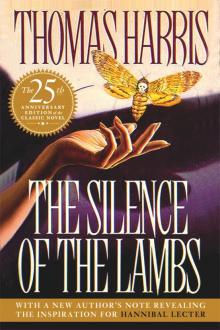 The Silence of the Lambs
The Silence of the Lambs Red Dragon
Red Dragon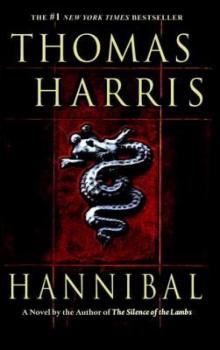 Hannibal
Hannibal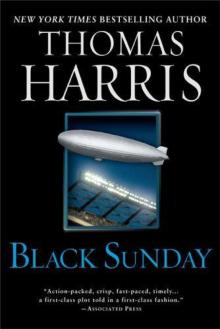 Black Sunday
Black Sunday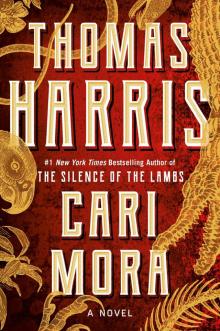 Cari Mora
Cari Mora Hannibal Rising
Hannibal Rising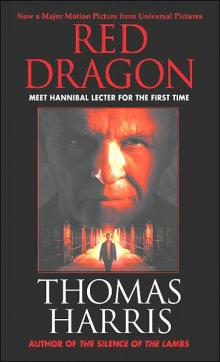 Red Dragon hl-1
Red Dragon hl-1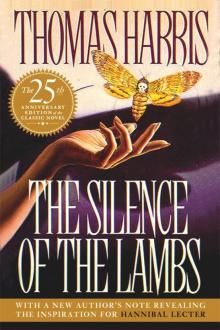 The Silence of the Lambs (Hannibal Lecter)
The Silence of the Lambs (Hannibal Lecter)